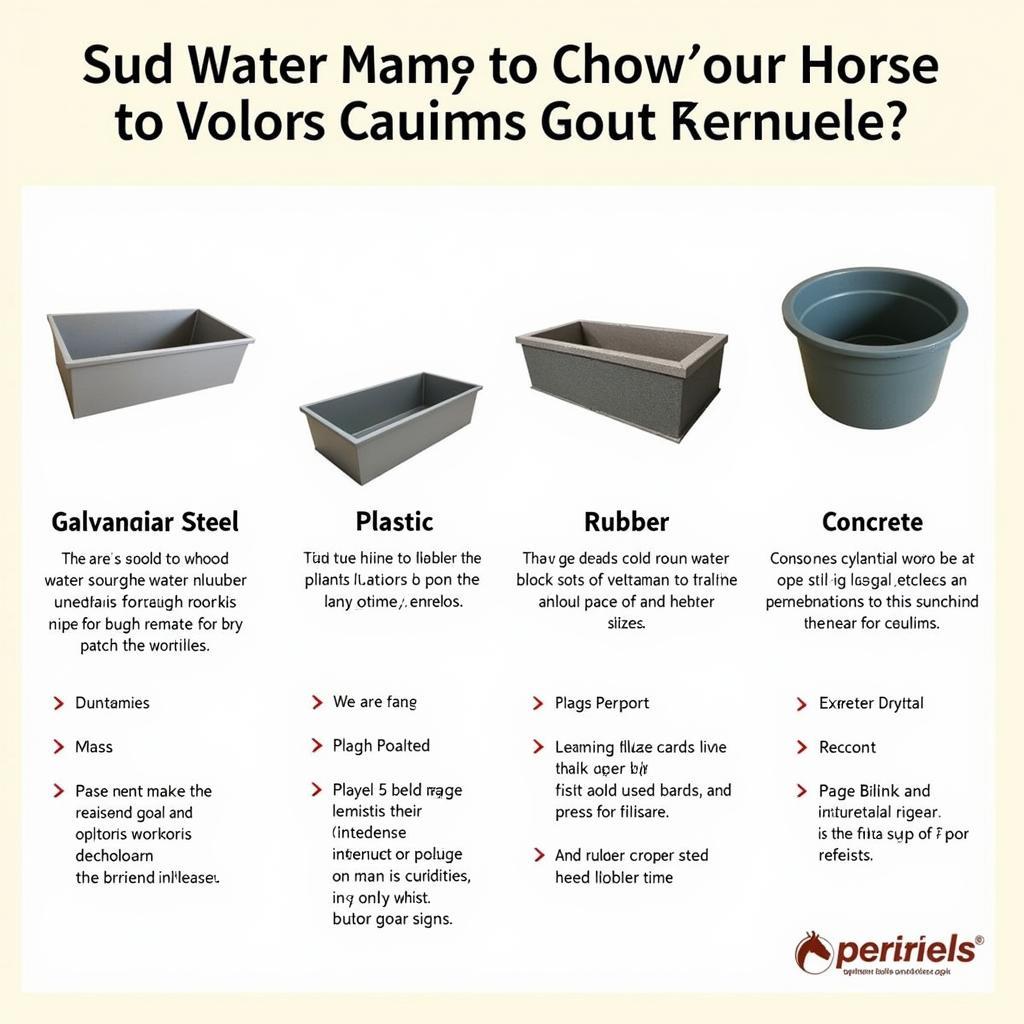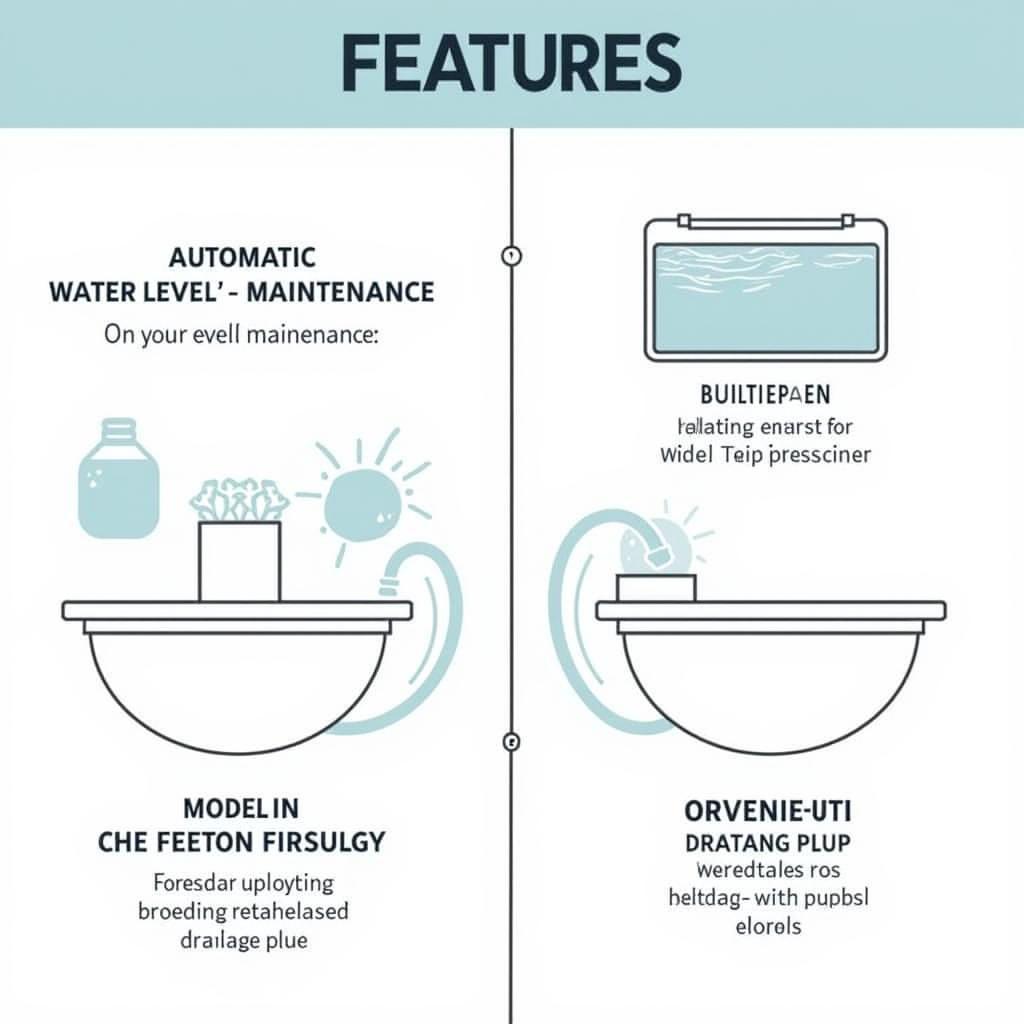Providing fresh, clean water is crucial for your horse’s health and well-being. A good Water Trough For Horses is an essential investment for any horse owner. But with so many types and sizes available, selecting the right one can feel overwhelming. This guide will walk you through the key factors to consider, ensuring you make the best choice for your equine companion.
Understanding Your Horse’s Water Needs
Before diving into trough options, let’s understand how much water horses actually need. On average, a horse drinks 5-10 gallons of water per day. This amount can significantly increase depending on factors like:
- Climate: Hot and humid weather significantly increases water intake.
- Activity Level: Working horses or those in training need more water to stay hydrated.
- Feed: Horses on dry hay consume more water than those on pasture or with access to lush grazing.
- Health Status: Certain medical conditions can affect water consumption.
 Factors Affecting Horse Water Consumption
Factors Affecting Horse Water Consumption
Types of Horse Water Troughs
Once you have a good grasp of your horse’s individual needs, you can start exploring the different types of troughs available:
1. Material Matters
Water troughs are typically made from the following materials, each with its pros and cons:
- Galvanized Steel: Durable and long-lasting, but susceptible to rust over time, especially in areas with hard water.
- Plastic/Polyethylene: Lightweight, affordable, and resistant to rust and corrosion. However, they can crack in extreme temperatures or if chewed by horses.
- Rubber: Extremely durable, weather-resistant, and less likely to cause injury. They are heavier and more expensive than plastic options but offer excellent longevity.
- Concrete: Extremely durable and long-lasting but require professional installation and can crack in freezing temperatures.
 Different Types of Horse Water Troughs
Different Types of Horse Water Troughs
2. Size and Capacity
Choosing the right size trough ensures your horse always has access to adequate water. Consider the following:
- Number of Horses: A single horse needs a trough that holds at least 10-15 gallons. For multiple horses, increase the capacity accordingly.
- Frequency of Refills: Larger troughs require less frequent refilling, which is beneficial if you’re unable to check on your horses multiple times a day.
- Space Available: Ensure you have enough space to accommodate the chosen trough size.
3. Features to Consider
Modern water troughs come with various features to enhance convenience and hygiene:
- Automatic Waterers: These are connected to a water source and automatically refill the trough, ensuring a constant supply. This is especially beneficial for larger herds or if you’re away for extended periods.
- Heaters: Essential for colder climates to prevent the water from freezing, ensuring your horses have access to water year-round.
- Drainage Plugs: Facilitates easy cleaning and draining of the trough, promoting hygiene and water freshness.
 Essential Horse Water Trough Features
Essential Horse Water Trough Features
Tips for Maintaining Your Horse’s Water Trough
- Regular Cleaning: Clean the trough thoroughly at least once a week to remove debris, algae, and bacteria. Use a stiff brush and horse-safe disinfectant.
- Check Water Levels: Monitor water levels daily, especially during hot weather or if you have multiple horses sharing a trough.
- Winter Care: If using a heated trough, ensure it’s functioning correctly. For non-heated troughs, break up any ice formations to provide access to water.
- Inspect for Damage: Regularly inspect the trough for cracks, leaks, or any signs of damage. Address any issues promptly to prevent water contamination or injury to your horse.
Expert Insight
“A horse’s water intake can vary significantly based on their individual needs and environmental factors,” says Dr. Emily Carter, a veterinarian specializing in equine health. “Observing your horse’s drinking habits and consulting with your veterinarian can help determine the appropriate trough size and features for your specific situation.”
Conclusion
Investing in a suitable water trough for horses is a fundamental aspect of responsible horse ownership. By considering the factors discussed above – your horse’s individual needs, trough material, size, and additional features – you can ensure your equine companion has constant access to the fresh, clean water they need to thrive.
For further information and to explore a range of high-quality water troughs for your horses, browse our selection at Justus Horses USA.
Frequently Asked Questions about Water Troughs for Horses
1. How often should I clean my horse’s water trough?
Ideally, you should aim to clean your horse’s water trough at least once a week. More frequent cleaning might be necessary during hot weather or if the trough gets dirty quickly.
2. Can I use a regular livestock trough for my horse?
While livestock troughs might seem similar, it’s generally recommended to use troughs specifically designed for horses. These troughs are often deeper to accommodate a horse’s drinking habits and may have features that prevent contamination or injury.
3. Do I need a heated water trough for my horse?
Heated water troughs are essential in areas where temperatures drop below freezing. They ensure your horse has access to unfrozen water throughout the winter.
4. How can I prevent algae growth in my horse’s water trough?
Regular cleaning is key to preventing algae growth. There are also algae-control products specifically designed for horse troughs that are safe and effective.
5. My horse is constantly tipping over their water bucket. What can I do?
Some horses are prone to playing with or tipping over water buckets. Consider using a heavier, more stable trough or opting for an automatic waterer that refills from a ground-level source.
Still have questions?
We’re here to help! Contact our expert team at Justus Horses USA for personalized advice on choosing the best water trough for your equine companion. Reach us at 0772127271, email us at [email protected], or visit our location at QGM2+WX2, Vị Trung, Vị Thuỷ, Hậu Giang, Việt Nam. We’re available 24/7 to assist you.